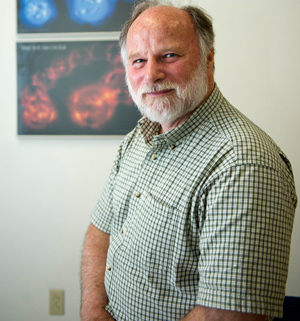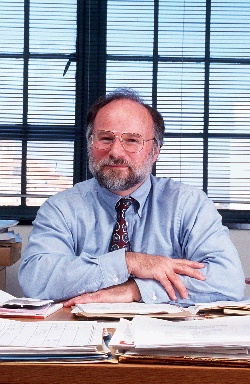The College of Arts & Sciences mourns the passing of Professor Emeritus of Astronomy Jeffrey Hughes, a towering figure in the field of space physics and a beloved member of the Boston University community.
Born and raised in Wales, Hughes’ journey into the cosmos began at Imperial College London, where he earned both his BSc and PhD in physics. His postdoctoral research took him across the Atlantic to the University of Colorado and to UCLA, before returning briefly to Imperial College. In 1978, he joined Boston University as an assistant professor of Astronomy—a decision that would shape the next 45 years of his life and leave an indelible mark on the institution.
 “I came to Boston University from London, not knowing whether I’d stay more than a few years, but I ended up being here for 45 years,” Hughes once reflected. “BU allowed me to thrive. I came from a post-doctoral research position, so BU is the only place I’ve been a faculty member, and during that time I’ve learned, I’ve taught, and I’ve grown (and accumulated a lot of stuff).”
“I came to Boston University from London, not knowing whether I’d stay more than a few years, but I ended up being here for 45 years,” Hughes once reflected. “BU allowed me to thrive. I came from a post-doctoral research position, so BU is the only place I’ve been a faculty member, and during that time I’ve learned, I’ve taught, and I’ve grown (and accumulated a lot of stuff).”
Throughout his career, Hughes was a prolific researcher and a passionate educator. His expertise in the physics of the space environment—particularly the solar wind’s interaction with Earth’s magnetic field—led to the publication of over 160 papers in leading scientific journals. He was a founding member of the Center for Space Physics in the mid-1980s and served as its first director for a decade, guiding its expansion and establishing it as a hub for groundbreaking research.
His leadership extended beyond the lab. Hughes served as the astronomy department’s director of graduate studies for seven years and later as director of undergraduate studies for three years. In 1997, he became chair of the astronomy department, a role he held with distinction for five years. Under his stewardship, the department flourished academically and administratively.
In 2002, Hughes took the helm of the Center for Integrated Space Weather Modeling (CISM), an NSF-funded Science and Technology Center based at BU. As principal investigator and director for eleven years, he led interdisciplinary efforts to understand and predict space weather phenomena that affect Earth’s technological systems and made lasting contributions to space science.
“His steady leadership guided this community of researchers from diverse specializations to develop and integrate computer models, including those still used today at NOAA’s Space Weather Prediction Center,” said Nicholas Gross, senior research scientist in the Center for Space Physics, who worked with Hughes at the Center for Integrated Space Weather Modeling. “Equally dedicated to education, he mentored countless young scientists and helped establish the CISM Space Weather Summer School, leaving a legacy of both scientific vision and generosity of spirit.”
From 2010 to 2017, Hughes served as associate dean of the Graduate School of Arts and Sciences, where his thoughtful leadership and clear-eyed reasoning benefited students and faculty alike. As associate dean, he helped to transform doctoral education in many fields, and to develop new professionally oriented master’s degrees, including the pioneering Master of Science in Statistical Practice and the Master of Science in Computer Science. He was also deeply engaged in College of Arts & Sciences’ Faculty Council and University Council, contributing to numerous committees and representing the College of Arts & Sciences with dedication.
“His thoughtful leadership in GRS guided our office and the college through many challenges and changes, always keeping in mind that the ultimate reason for our being was service to and growth of our students,” said Janette Countryman, director of finance and PhD admissions & financial aid in the Graduate School of Arts & Sciences. “I learned a lot from Jeff and considered him a mentor and friend. He will be sorely missed.”
“He made it his mission to improve the experiences and outcomes for graduate students across the university,” added Dan Clemens, professor emeritus of astronomy. “His efforts and accomplishments were appreciated and envied. I interacted with him frequently in his decanal role and always found his wisdom, experience, and interest exceptional and impressive.”

Clemens said when the department revamped the astronomy graduate curriculum, Hughes “stepped up to do the heavy lifting of sorting out the many conflicting goals and desires of students, faculty, and administration and he did so happily.” More recently, he took an active role in updating the department’s undergraduate program during the creation of the BU HUB, “helping faculty advisors and their students come to understand this new academic environment and conveying our in-the-trenches HUB experiences back to the administration for the betterment of all.”
“Jeff has always impressed me as someone who never said ‘No’ when asked to take on a difficult or time-consuming role,” he said. “He consistently stepped up, engaged with the issues thoroughly, and returned value and innovation… His selfless drive to find best solutions for everyone has left both a lasting legacy of a workable academic program and a long line of successful PhD and MA graduates.”
 As a teacher, Hughes was revered for his animated lectures, well-organized presentations, and intellectually rigorous assignments. He taught courses ranging from advanced graduate seminars to cosmology for non-science majors, always earning high praise from his students. He mentored countless graduate students, many of whom went on to distinguished careers in academia, industry, and public service.
As a teacher, Hughes was revered for his animated lectures, well-organized presentations, and intellectually rigorous assignments. He taught courses ranging from advanced graduate seminars to cosmology for non-science majors, always earning high praise from his students. He mentored countless graduate students, many of whom went on to distinguished careers in academia, industry, and public service.
“When, as chair of the department, I observed his teaching, I was astonished to witness a master at all levels, from introductory courses for non-science majors—including one on cosmology, which was very far from his specialty of the Earth’s space environment—to the highest-level graduate courses,” said Alan Marscher, professor emeritus of astronomy.
Colleagues remember Hughes as a thoughtful, committed, and principled leader, mentor, and friend, whose contributions enriched not only the Astronomy Department but the entire university.
“Jeff was the best of colleagues,” said Kenneth Janes, professor emeritus of astronomy, who was involved in hiring Hughes in 1978. “He was involved in every aspect of academic life, teaching, research and administration… [and] he got things done, without much fuss or drama. Whenever I would meet up with him, whether in a meeting or just passing in the hallway, he would always greet me with a smile.”
“Jeff excelled in every aspect of his professional life,” Marscher added. “He was a highly valued, personable colleague who will be greatly missed.”
Hughes felt the same about his colleagues. When reflecting on his career before retirement, he wrote:
 “I have benefited from wonderful supporting colleagues and great students in my department, within the college, and the University more widely. I’ve taught and mentored students and helped hire new faculty colleagues, the two critical tasks that faculty must accomplish in order to sustain a university, and it’s been a privilege to do so… I’ve learnt a lot. I can confirm that the old adage—if you want to learn something, volunteer to teach it—is absolutely true.”
“I have benefited from wonderful supporting colleagues and great students in my department, within the college, and the University more widely. I’ve taught and mentored students and helped hire new faculty colleagues, the two critical tasks that faculty must accomplish in order to sustain a university, and it’s been a privilege to do so… I’ve learnt a lot. I can confirm that the old adage—if you want to learn something, volunteer to teach it—is absolutely true.”
He added, “So let me end by thanking all my colleagues who’ve made my life here so fulfilling, but especially those colleagues who, over the years, have convinced me to teach a course outside my immediate area of expertise.”
Professor Hughes’ legacy will continue to shine through the students he inspired, the research he advanced, and the community he helped build. He leaves behind a constellation of achievements and memories that will guide Boston University for years to come.
“He was a friend to many of us, as well as a valued member of our community. He will be sorely missed,” Paul Withers, chair of Astronomy, wrote in a note to the department. “He will be remembered amongst us for many contributions, including hosting legendary departmental croquet tournaments and building a flourishing community around BU’s NSF-supported Center for Integrated Space Weather Modeling.”